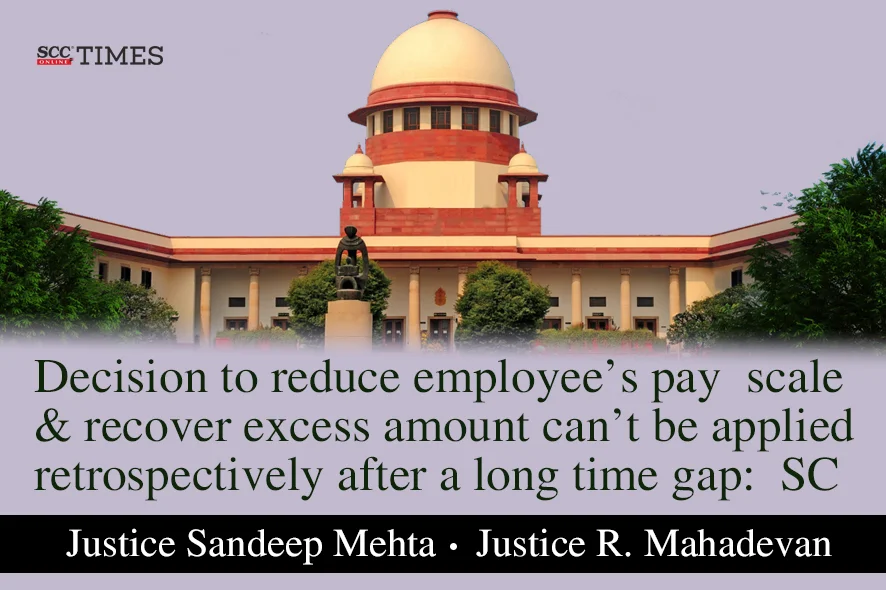Supreme Court: While considering the instant appeal wherein the order by the Bihar Government directing reduction in the pay scale and recovery of excess recovery of excess amount and the order of Patna High Court upholding the same, was challenged by the appellant; the Division Bench of Sandeep Mehta* and R. Mahadevan, JJ., opined that that any decision taken by the State Government to reduce an employee’s pay scale and recover the excess amount, cannot be applied retrospectively and that too after a long time gap. The Court further stated that any step of reduction in the pay scale and recovery from a government employee would be like a punitive action because the same has drastic civil and evil consequences.
Background and Legal Trajectory: The appellant was appointed to the post of Supply Inspector in the Government of Bihar in 1966. After serving for 15 years, he received his 1st time bound promotion as Marketing Officer and was put in Junior Selection Grade w.e.f. 1-4-1981. Upon completing 25 years in service, the appellant was further promoted to the post of Senior Selection Grade, Marketing Officer-cum-Assistant District Supply Officer (ADSO) w.e.f. 10-3-1991 in the pay scale of Rs.2000-3800.
The Government of Bihar issued a Resolution dated 8-2-1999 revising the pay scale of Marketing Officer from Rs.1640-2900 to Rs.5500-9000 and that of ADSO, from Rs.2000-3800 to Rs 6500-10500 w.e.f. 1-1-1996. Since the appellant had been promoted as ADSO w.e.f. 10-3-1991, his pay scale was revised to Rs.6500-10500 in accordance with the Resolution.
The appellant retired from the post of ADSO on 31-1-2001. At the time of retirement, the last pay drawn by the appellant was Rs.10500 in the pay scale of Rs.6500-10500 with admissible emoluments. As per the Bihar Pension Rules of 1950, his pension was calculated at 50% of the average emoluments and was quantified at Rs 5247 per month and was disbursed to the appellant from the from the date of his retirement.
However, on 28-1-2003, Accountant General for the State of Bihar raised an objection regarding promotion of the appellant with a further remark that the promotion given to the appellant in March 1991 would become ineffective after 1-1-1996 in view of the Government Resolution dt. 8-2-1999 and, thus, the pay scale of the appellant would have to be revised and reduced to match that of the Marketing Officer.
Furthermore, after a lapse of 8 years from his retirement, the appellant received a letter dated 15-4-2009 from the Government of Bihar conveying that an error had been committed in his pay fixation and, therefore, a sum of Rs.63,765 had to be recovered from him as the same had been paid in excess beyond his entitlement. The letter directed the appellant to refund the aforesaid amount in one go or installments.
Aggrieved by the reduction in his pension and the afore-stated recovery notice, the appellant made representations to the government authority but was unsuccessful. Hence, he approached the Patna High Court, wherein the decision to revise and reduce the appellant’s pension was upheld.
Aggrieved by the decision of the Patna High Court, the appellant approached the Supreme Court.
Contentions: Counsels for the appellant submitted that the Resolution dt. 8-2-1999 was misinterpreted by the authorities and the High Court. The appellant further contended that the reduction in the pay scale of the appellant and the direction to effect recovery eight years after his retirement, was done without adhering to the principles of natural justice, and is illegal, arbitrary and violative of Articles 14 and 16 of the Constitution.
Per contra, the respondents argued that the Government Resolution dated 8-2-1999 was made uniformly applicable to all employees in the State of Bihar. The appellant has not been singled out for the impugned action and thus, there is no question of any discrimination being meted out to the appellant.
Court’s Assessment: Perusing the matter, the Court noted that the appellant was accorded time bound promotion from the post of Marketing Officer in Junior Selection Grade to ADSO and the same has not been disputed. The appellant having been duly promoted was entitled to and was rightly given the pay scale of the promotional post. Pursuant to the 5th Pay Commission being applied, the Government of Bihar issued the Resolution dated 8-2-1999, whereby the pay scale applicable to the post of Upper Senior Grade (Upper Marketing Officer) was revised.
Considering Para 11 of the Resolution, the Court observed that the order specifically protected the promotions granted to the employees prior to 31-12-1995. Only employees not promoted by the cutoff date, i.e., 31-12-1995, would get a notional promotion and rise in pay scale which would end w.e.f. 31-12-1995. It was observed that the appellant could not have been put to a disadvantage and his pay scale could not have been reduced prospectively by virtue of the said Resolution.
Taking note of the order dt. 15-4-2009, the Court was of the view that no departmental action could have been initiated by the State against the appellant after eight years following his retirement because the employer employee relationship had come to an end after the appellant’s superannuation. The order directing reduction in pay scale and recovery from the appellant was manifestly not preceded by any show cause notice and was thus passed in gross violation of the principles of natural justice.
The Court also opined that decision to reduce pay-scale and recover the excess amount, cannot be taken retrospectively after the passage of a long time. Relying on several precedents especially a recent decision in Thomas Daniel v. State of Kerala, 2022 SCC OnLine SC 536, wherein the Court held that the State cannot recover excess amount paid to the ex-employee after a delay of 10 years.
Perusing Para 11 of the Resolution dt. 8-2-1999, the Court noted that it is amenable to the interpretation that it protects the status and pay of employees who received their time-bound promotions before 31-12-1995. Therefore, the Secretary concerned, while rejecting the appellant’s representation clearly misinterpreted and misapplied the said Resolution, similarly, the Patna High Court also committed the same error.
Thus, the Court decided that the impugned action and orders directing reduction of pay scale and recovery of the excess amount from the appellant was grossly arbitrary and illegal and suffered from the vice of non-adherence to the principles of natural justice and hence, the same cannot be sustained.
Allowing the appeal, the Court further directed that if any reduction in pension and consequential recovery was made due to the impugned orders, the appellant shall be entitled to restoration/reimbursement, with interest as applicable.
CASE DETAILS
|
Citation: Appellants : Respondents : |
Advocates who appeared in this case For Petitioner(s): For Respondent(s): |
CORAM :









